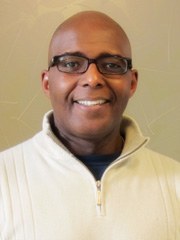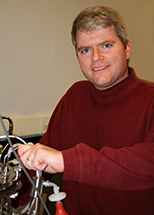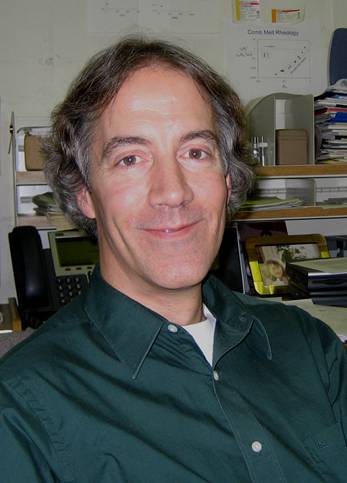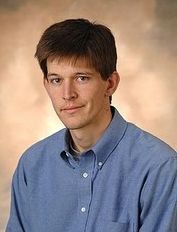 Group Members Group Members 
|
 |
Collaborations
|
|
Our varied areas of research helps us to collaborate with
different fields of science. These are some of the brilliant minds we collaborate with.
|
 |
 |
Craig Cameron
Penn State University
Paul Berg Professor of Biochemistry and Molecular Biology
Associate Department Head for Research and Graduate Education
Faculty webpage
Research interests:RNA polymerases and RNA-binding proteins in viral
infection and mitochondrial disease
|
 |
Jeff Catchmark
Penn State University
Associate Professor, Department of Agricultural and Biological Engineering
Faculty webpage
Research interests: Cellulose synthesis and organization, cellulosic
composites and coatings, and chemically powered microfluidic and biological devices
and sensors.
|
 |
Ralph Colby
Penn State University
Professor of Material Science and Engineering
Faculty webpage |
Group website
Research interests: Polyelectrolytes, ionomers, liquid crystalline polymers,
block copolymers, miscible polymer blends, branched polymers, networks of both charged and
uncharged polymers, surfactants, and colloidal suspensions.
|
 |
Daniel Cosgrove
Penn State University
Professor of Biology
Faculty webpage |
Group website
Research interests: Our research focuses on the cellular and molecular
mechanisms of cell expansion. By use of biophysical, biochemical and molecular
techniques, in combination with whole-plant measurements, we are trying to determine
(a) which processes limits growth under normal and stressed conditions and (b)
how plants regulate their growth rates.
|
 |
Enrique Gomez
Penn State University
Assistant Professor, Chemical Engineering
Faculty webpage |
Group website
Research interests: Our research focus is on understanding how structure at various length scales affects macroscopic properties of soft condensed matter. Though diverse, complex organic molecules share free energy landscapes dominated by non-equilibrium states and a theme of disorder. Understanding the fundamental processes that lead to, for example, charge transport and separation requires characterization of equilibrium, near equilibrium and far from equilibrium structures.
Current efforts are directed at understanding the structural parameters which affect the performance of organic solar cells through a combination of electron and light microscopy, X-ray and light scattering, electron diffraction, and device testing. Through model systems, we study the physics of charge injection and charge transfer at semiconductor-metal interfaces as well as organic heterojunctions.
|
 |
Michael Janik
Penn State University
Assistant Professor and Chair of the Brennan Clean Energy Early Career Professorship
Department of Chemical Engineering
Faculty webpage |
Group website
Research interests: Current research in our lab utilizes atomistic modeling
techniques, mainly first principles based electronic structure methods, to probe the
relationship between the structure/composition of catalytic materials and their
activity and selectivity. Specific emphasis is placed on catalytic processes of
relevance to alternative energy conversion technologies, and current research
concentrates on electro-catalytic systems such as fuel cell electrodes.
|
 |
Manish Kumar
Penn State University
Assistant Professor
Department of Chemical Engineering
Faculty webpage |
Group website
Research interests: The short term goal of our group is to understand protein polymer interactions
and develop devices and membranes inspired by cell membranes.
The long term goal is to emulate these native biological structures with
robust polymeric or engineered protein structural elements.
|
 |
Scott Milner
Penn State University
Joyce Chair Professor of Chemical Engineering
Faculty webpage |
Group website
Research interests: Our research is focused on microscopic, physical understanding of the origin of the unique material properties of polymers and complex fluids. The hallmarks of these "soft" systems are: (1) interplay between thermal fluctuations and energetic tendency to order; and (2) exquisite sensitivity of structure to imposed fields, particularly deformation and flow.
These features of soft systems afford unique opportunities for design and control of material properties, but also pose substantial theoretical challenges. Material design in the huge parameter space of complex fluids cannot be achieved by a strictly empirical approach, but requires a conceptual understanding as well, to successfully exploit the potential of these remarkable materials.
|
 |
Karl Mueller
Penn State University
Professor of Chemistry
Faculty webpage |
Group website
Research interests: The development and utilization of solid-state
nuclear magnetic resonance (SSNMR) techniques, primarily driven by materials and
environmental science questions that require advanced NMR tools; Studies of the
reactivity of oxide surfaces, a complex scientific issue related to such technical
considerations as stability of surfaces, weathering in either harsh or mild
environments, and bonding of chemical species for industrial applications;
Understanding the transport of pollutants in the environment; The use of
cyberinfrastructure for increasing our scientific capabilities for knowledge
discovery in chemistry, especially in the area of environmental kinetics
measurements and modeling
|
 |
Willian Noid
Penn State University
Associate Professor of Chemistry
Faculty webpage |
Group website
Research interests:Theories of statistical mechanics applied to develop multiscale methods for modeling
soft materials, biophysics of intrinsically disordered proteins and glycoproteins, physics-based theories for improving
knowledge-based protein models.
|
 |
Loukas Petridis
Center for Molecular Biophysics
Senior Scientists
Faculty webpage |
Group website
Research interests:Investigation of the origins of biomass recalcitrance via
integration of computer simulation with neutron scattering experiments.
|
 |
James Runt
Penn State University
Professor of Polymer Science
Faculty webpage
Research interests:Broadband dielectric spectroscopy; polymer dynamics
Ion-containing polymers: electrolytes, ionomers;
Segmented polyurethane and polyurea block copolymers;
Hydrogen bonded polymer blends and solutions;
Polymers with intrinsic microporosity (PIMs);
Crystalline polymers, from renewable resources;
Nanoscale structure and morphology
|
 |
Susan Sinnott
University of Florida
Director, Cyberinfrastructure for Atomistic Simulation (CAMS)
Alumni Professor of Materials Science
Materials Science and Engineering
Faculty webpage
Research interests: Develop innovative atomic-scale simulation methods to enable
material design and discovery; investigate structure-property relationships by correlating microstructural,
interfacial, and surface structures with electronic properties, chemical reactivity, mechanical responses,
and stability.
|
 |
Karen Winey
University of Pennsylvania
Professor of Materials Science & Engineering
Professor of Chemical & Biomolecular Engineering
Faculty webpage |
Group website
Research interests: Structure-property relationships in polymers. Ion-containing
polymers, ionomers, polymer nanocomposites including carbon nanotubes, and block copolymers.
Expertise in polymer morphology using electron microscopy and x-ray scattering. Ion transport,
polymer dynamics, electrical properties, mechanical and rheological properties, and thermal
conductivity.
|
|
